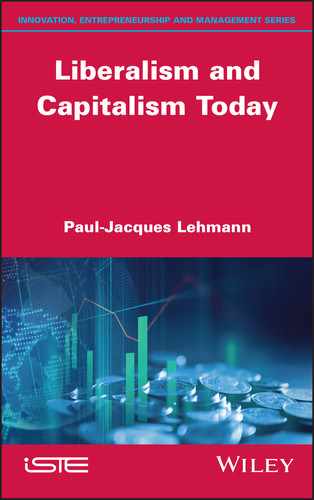It now seems to be a given that the principles that presided over the birth of liberalism and capitalism are no longer relevant. To understand the evolution of this ideology and economic system, Liberalism and Capitalism Today examines the work of the two authors who have contributed the most to the analysis of the conditions that lead to the emergence of these types of organization: Alexis de Tocqueville of France and Max Weber of Germany.
This book thus analyzes how the evolution of the general environment of a civilization leads to the emergence of new ways of approaching economic life, and then to its development, thanks to innovations in many fields.
This historical perspective makes it possible to understand the transformations that liberalism and capitalism could offer. It suggests a potential path that does not involve simply returning to a way of life that has been totally altered by the evolution of civilizations and the economy, but instead leads to a more peaceful way of living in most countries of the world.
Table of Contents
- Cover
- Title Page
- Copyright
- Introduction
- PART 1: The Conditions in Which Liberalism and Capitalism Appeared
- 1 Political and Legal Conditions
- 1.1. Liberalism and democracy: new eldorados of political thought and political life
- 1.2. The right of ownership as a necessary condition for savings and capital formation
- 1.3. The advent of the bourgeoisie
- 1.4. The nascent authority of state bureaucracy
- 2 Economic and Sociological Conditions
- 2.1. Trade and industry: competitors of agriculture and the craft industry
- 2.2. The dangers of industrialization
- 2.3. The decisive influence of the Protestant religion on economic rationalization
- 2.4. The role of money and financial markets
- PART 2: The Evolution of Liberalism and Capitalism
- 3 The Birth of a New Capitalism in a New World: Financial Capitalism
- 3.1. The emergence and development of financial capitalism
- 3.2. Changes in corporate governance
- 3.3. New economic policies
- 3.4. From the perfection of theoretical capitalism to the crises of real capitalism
- 3.5. Recurrent causes of the crises of capitalism
- 3.6. Some examples of crises of capitalism
- 4 Towards 21st Century Capitalism
- 4.1. A responsible and proactive economic policy
- 4.2. Finance that respects the principles of capitalism
- 4.3. Renewed corporate governance
- Conclusion
- References
- Index
- End User License Agreement
